The following hospital reviews are written as an expat residing in Beijing. I review visits to four of the top public hospitals used most frequently by foreigners in Beijing. These hospitals include:
- Chaoyang Hospital
- China-Japan Friendship Hospital – also known as the Sino-Japan Friendship Hospital
- Beijing Friendship Hospital
- Peking Union Medical College Hospital (PUMC) – also known as the XieHe Hospital
These hospital reviews list the procedures I went through from booking a doctor’s appointment through to diagnosis and treatment. It also includes the fees I paid for consultations, tests, exams and medicines.
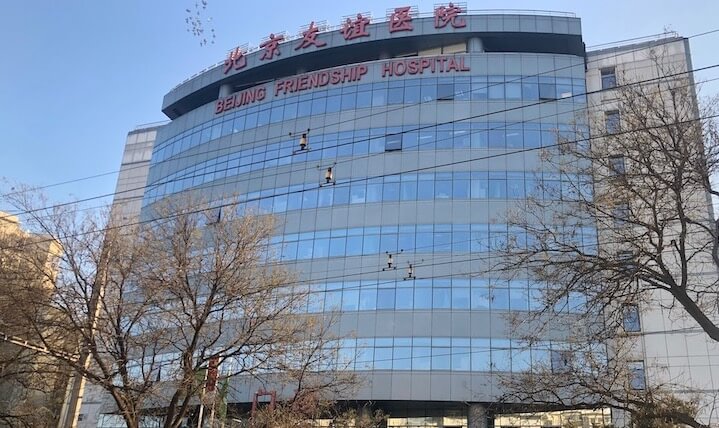
These hospital reviews mainly cover outpatient services at the hospitals. I do, however, include some information for inpatient hospitalization that I gathered during my visits.
Contact information for each of the 4 hospitals including their websites and WeChat official accounts are provided together with the review.
Satisfaction
I was very satisfied with the quality of care I received on most of my visits to these hospitals. I was also amazed at the convenience of booking a doctor appointment through several apps and WeChat official accounts.
Fortunately, foreigners in Beijing can register an account to use these apps. This made it much more convenient to book a doctor appointment in Beijing compared to when I previously tried to book a doctor appointment at a public Shanghai hospital.
Foreigners Using Chinese Hospitals
The 4 hospital reviews here are for state-run public Beijing hospitals which primarily cater to the local population in Beijing. Most of them, however, also allow foreigners to use their main outpatient section.
Nevertheless, public hospitals in China can be difficult for foreigners to use!
Finding the correct counters for registering, paying fees and booking tests can be difficult. After which, you will need to navigate your way to multiple locations in the hospital for consultations, tests and exams.
You will need to communicate with numerous hospital staff including doctors, nurses and cashiers who speak very little English. Being able to speak Chinese therefore, can be critical for using a public hospital in China. Expats who do not speak Chinese would need to have a patient Chinese speaking friend accompany them on each visit.
Public Beijing hospitals are also very crowded. This puts pressure on the doctors to see many patients each day. Therefore, your doctor consultation will be quite brief.
If you have comprehensive medical insurance, the international hospitals and clinics in Beijing would probably be a better choice for your healthcare needs. At such facilities you will receive higher quality personal care in a more relaxed environment; similar to what you are accustomed to back home.
However, such international healthcare providers in China charge much higher fees for consultations, tests and treatments than do public hospitals. So if you are on a low budget and only have medical insurance for inpatient care, you might consider trying out a public hospital.
During my visits to the 4 hospitals I review here, I always saw a few other foreigners seeking care. Most of them were accompanied by Chinese friends.
I myself have the advantage of speaking and reading Chinese. So I was able to make use of the apps for booking doctor appointments as well as communicate with hospital staff and navigate the hospital sections.
These 4 Beijing hospitals also have VIP wards catering to foreigners and wealthy locals.
The VIP wards, however, will also charge fees much higher than those in the main section of the hospital; fees similar to what the international hospitals in China charge. I list some of the consultation fees for VIP wards, as well as the premium they charge for tests and treatments.
Chaoyang Hospital Review
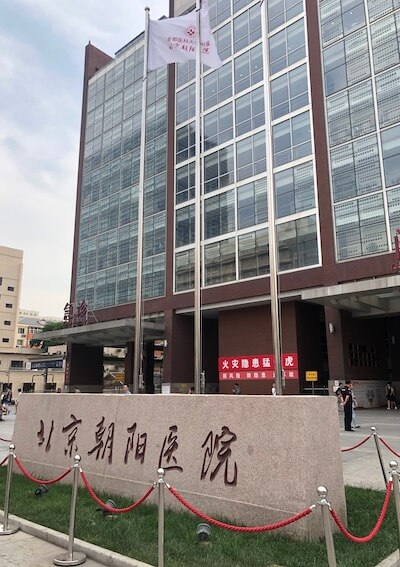
Chaoyang Hospital is a top rated comprehensive Western medicine hospital with departments for all medical needs. It is conveniently located near expat dense compounds in south Chaoyang district and Sanlitun.
The Chaoyang Hospital is affiliated to the Capital Medical University where many of its doctors study before practicing at the hospital.
The Chaoyang Hospital outpatient section is located in a very modern 9-story complex at the front of the hospital compound. Its inpatient section has over 1,400 beds.
This hospital allows foreigners to use the main outpatient section. There is also a small VIP ward on the top floor.
If you need to get proof of a negative test for COVID-19 for travel purposes, the Chaoyang Hospital has a Health Check-up site located opposite the West gate of the main hospital complex. This is only for people without any symptoms of the disease.
Booking a Doctor Appointment
- I was having some slight pains in my lower abdomen. A Chinese friend referred me to the 114 Health official WeChat account for booking a doctor appointment.
- I set up an account on the app using my foreign passport to register. The app, however, is all in Chinese.
- I searched for the Chaoyang Hospital and then the urology department.
- Here are listed various doctors and their available times. I had the choice of a general doctor for RMB 60 (US$ 8.70) or a Specialist for RMB 80 (US$ 11.60).
- I booked an appointment with a Specialist surgeon and received an SMS message with a temporary medical card number and the appointment confirmation.
- The 114 Health app allows you to cancel the appointment before 4pm the day prior to the appointment.
Hospital Procedures
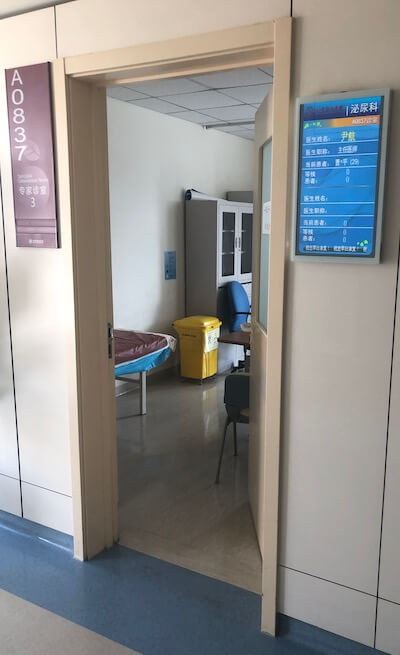
- At the Chaoyang Hospital I was directed to a window on the first floor for obtaining an official Beijing hospital medical card. I showed them the temporary medical card number as well as my passport and paid RMB 10 (US$ 1.50) in cash. This took just a few minutes.
- Be sure to bring some cash as the initial registration fee at Beijing hospitals must be paid in cash. Most other fees at the hospital, however, can be paid by WeChat wallet or Alipay.
- I went to the 8th floor as per the instructions on the 114 Health app.
- I went to the payment window and showed them the doctor appointment information I received through the app and paid the RMB 80 (US$ 11.60) consultation fee. The 114 Health app does not collect fees directly.
- I was given a number and directed to the waiting area in front of the consultation room.
- The consultation room had an electronic screen beside the door. After waiting for about 1 hour my name appeared on the screen.
- The Specialist doctor has his own consultation room, which is small, but very clean.
- The doctor insisted on practicing his English with me. His English level was acceptable, but I did have to switch into Chinese occasionally. The door was left the open during the consultation.
- After explaining my ailment the doctor immediately prescribed some blood and urine tests and an ultrasound exam. The consultation lasted about 5 minutes.
- With my prescription for tests I first went to settle the fees at the payment counter. I paid RMB 177 (US$ 25.60) for a PSA test, which is a blood test to screen for prostate cancer. I paid another RMB 26 (US$ 3.80) for the urine test.
- I could take the blood and urine tests immediately, but had to book an ultrasound exam for a couple of days later.
- The blood and urine test results were available within one hour. I printed them out from an ATM-type machine after scanning the QR code on my test form.
- I immediately returned to see the original doctor. I did not need to book a new appointment. After finishing up with one patient the doctor asked the next patient in line to wait a bit longer while he went over my results.
- The doctor spent another 10 minutes with me including a more detailed physical exam. The doctor closed the door during this examination, but as soon as I dropped my pants another patient opened the door to speak to the doctor.
- The doctor said that there appeared to be nothing serious, but I should book another appointment after I had received the ultrasound report.
- I tried to book this appointment for two days later immediately after the ultrasound exam. The same doctor, however, was only on duty two days a week, so I had to book it for a few days later.
Ultrasound Exam
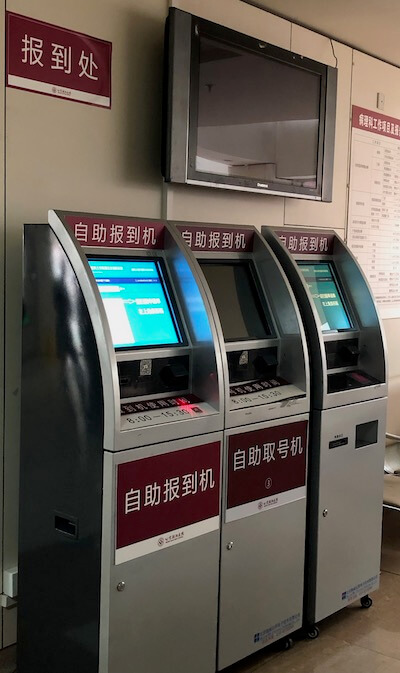
- I came back to the Chaoyang Hospital a couple days later for the ultrasound exam.
- The ultrasound fee was RMB 165 (US$ 24)
- I had been given a one-hour window for the appointment time.
- In the ultrasound section, I first checked-in (Bàodào – 报道) by scanning my booking ticket at the designated machine. I waited about 30 minutes for my name to appear on the board and then went into the exam room.
- After the exam I waited about 10 minutes to receive the results.
Final Consultation
- A few days later I came back with my ultrasound exam results to see the same surgeon.
- The doctor spent a few minutes going over the results. He told me there was nothing serious and I did not need to take any drugs. He gave me some advice on diet and told me to avoid sitting for long periods of time. I should try this for a couple of weeks and if the pain persisted I should come for another appointment.
Results
By following the doctor’s advice the pain went away and I did not need to return to the hospital.
VIP Ward of Chaoyang hospital
- I went up to check out the small VIP section on the top 9th floor of the Chaoyang Hospital.
- The nurses at the front counter were very friendly and able to speak some English.
- The consultation fee for a Doctor appointment at this VIP ward is RMB 300 (US$ 44).
- You can directly phone the Chaoyang Hospital VIP section to book a doctor appointment at 85231481 or 85231653.
- Language: On the phone, you should tell the VIP ward attendant if you need an English speaking doctor. They will do their best to find one from the main section of the hospital for your consultation.
- You will have your consultation in the very quiet and uncrowded VIP ward, but still have to go to the main section of the hospital for most tests. The VIP ward, however, will book the tests for you, and direct you to the various locations you need to go for tests.
- Test Fees: The VIP ward will charge you twice the fee that the main section of the hospital would charge for a test.
- Hospital: The VIP ward does not have any beds, so you will be assigned to the main section of the hospital if you require hospitalization. You will not be able to have a private room, and instead share one with up to 7 other patients.
- Hospitalization Fees: The VIP ward will charge you the same hospitalization fees as if you booked directly in the main section of the hospital. This is an advantage over larger VIP wards at the other hospitals where you might be able to get a private room, but will pay higher fees for all services.
Chaoyang Hospital Contact Information
Main Campus
Address: 8 Gongren Tiyuchang Nanlu, Chaoyang District
Western Campus
Address: 5 Jingyuan Road, Shijingshan District
Website:
https://www.bjcyh.com.cn/Html/News/Articles/21569.html
https://www.bjcyh.com.cn/Html/Index.html
WeChat ID:
chaoyangyiyuan
Chaoyang Hospital VIP ward
Location: 9th floor of the Chaoyang Hospital main campus
Tel: 85231481 or 85231653
Chaoyang Hospital Test Center
Provides nucleic acid tests for COVID-19 for travel purposes for people with no symptoms.
WeChat ID: gh_4b5950134790
Tel: 89138250, 89138251
China-Japan Friendship Hospital Review
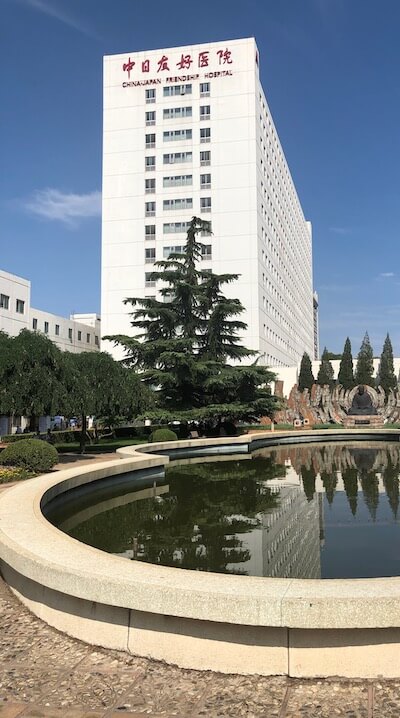
The China-Japan Friendship hospital is conveniently located for expats who live in the north of Chaoyang district. This hospital was the first in Beijing to set up a department especially to cater to foreigners.
The China-Japan Friendship hospital began operations in 1984. The outpatient section in the main building looks older and darker inside than the other 3 hospitals reviewed in this article. Definitely not as modern looking and clean as the Chaoyang Hospital outpatient section. The hospital compound, however, is quite beautiful with a small garden and pond.
This hospital allows foreigners to use their main section. This hospital also a VIP ward where you can receive more personal care for a higher fee.
Hospital Procedures
- I had diarrhea, so decided to visit this hospital.
- I had trouble booking an appointment for the main section of the hospital through the 114 Health app, so decided to go directly to the hospital. (Please not that during the Covid pandemic most hospitals in China require you to book an appointment in advance and do not accept drop-ins. This visit was pre-covid).
- I first went to the main building of the China-Japan Friendship Hospital where the outpatient clinic is located. This building looked much older on the inside than the Chaoyang Hospital.
- As I had a possible infection, they told me to go to the infectious disease ward of the hospital, located in a different building.
- The infectious diseases department, is in an even older looking one-story building inside the hospital compound.
- Within this building is also the Fever Clinic, where you would go for testing if you have COVID-19 symptoms.
- Although the Beijing hospital medical card I received at the Chaoyang Hospital is valid city wide, it is not valid for the China-Japan Friendship Hospital. This hospital comes under a different medical system structure, directly affiliated with China’s Ministry of Health.
- Registering for a new medical card at this hospital was very quick and cheap. In the infectious diseases department I just filled in a simple form and paid RMB 50 (US$ 7.30) in cash (must pay in cash).
- The waiting area in the infectious diseases department was very narrow, so it felt very crowded with just a few people waiting.
- After waiting about 20 minutes it was my turn for the consultation.
- The doctor asked me my ailment and immediately prescribed a blood test.
- I paid RMB 27.53 (US$ 4.00) for the test.
- I waited about 15 minutes to get the blood test, which was conducted just down the hall from the consultation room.
- I received the test result in about 30 minutes.
- I went back to the same doctor and showed him the test result. He immediately prescribed some antibiotics and asked me to come back if it did not get better.
- I paid RMB 185 (US$ 26.80) at the counter across from the consultation room for the medicine.
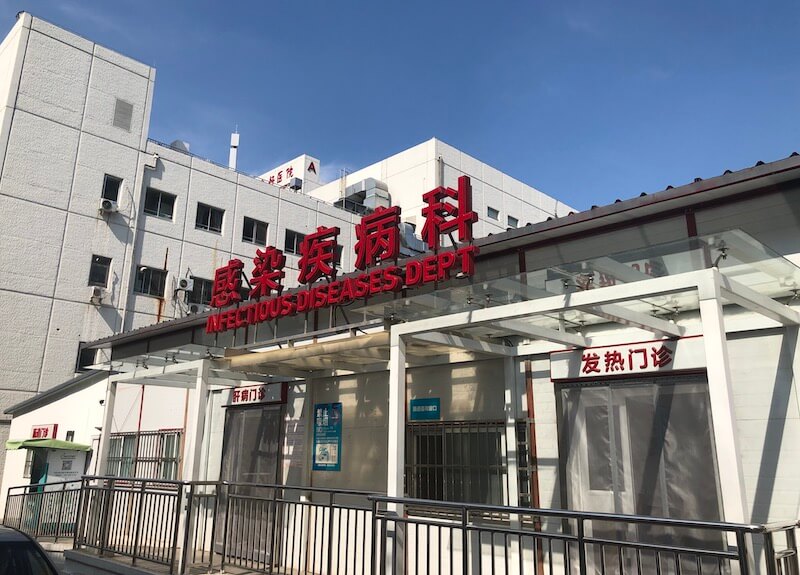
Results
After taking the antibiotics I was quickly cured.
VIP Ward of the China-Japan Friendship Hospital
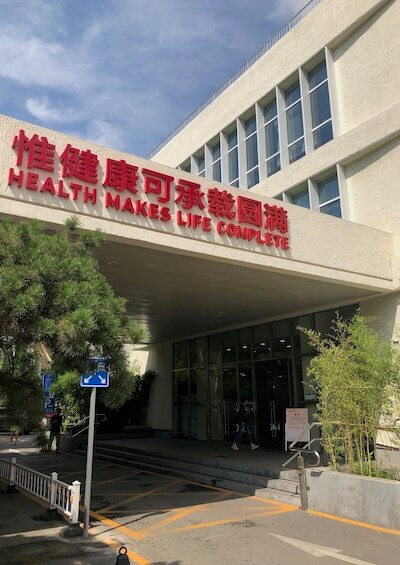
- The VIP ward of the China Japan Friendship Hospital has its own less crowded, more comfortable building inside the hospital compound. It is called the International Department (Guójì bù – 国际部).
- This VIP ward is much larger than the one at the Chaoyang Hospital.
- Simple tests and some procedures can be carried out in this building, without the patient needing to go to the main section of the hospital.
- There are more staff working full-time in this VIP ward than at the Chaoyang Hospital VIP ward. Most of them speak decent English.
- The consultation fee in this VIP ward is between RMB 200 (US$ 29) and RMB 500 (US$ 73) depending on the type of doctor you need to see.
- This VIP ward charges 2 to 5 times the fee charged for the same test done in the main section of the hospital. For instance, in the VIP section I would have had to pay RMB 120 (US$ 17.40) for the blood test that I paid RMB 27.53 (US$ 4.00) for in the infectious diseases department.
- You might be able to have a private room if the International Department assigns you for hospitalization.
China-Japan Friendship Hospital Contact Information
Address:
Chaoyang North, #2 Yinghuayuan Dong (East) street
Tel: 84206060
Website:
https://www.zryhyy.com.cn
WeChat ID:
zryhhospital
IOS App:
zryh,中日医院
https://apps.apple.com/app/id1299580685
International Department
Appointment Tel: 6422 2952 , 6428-2297, 8420-5071
Beijing Friendship Hospital Reviews
Located near Tiantan Park in South Central Beijing it has long been popular with foreigners in the city.
Like the Chaoyang Hospital, this hospital is also affiliated to the Beijing Capital Medical University.
The Beijing Friendship Hospital is well known for its Gastroenterology (digestion) division.

The Beijing Friendship Hospital allows foreigners to use the main section of the hospital. You can conveniently book appointments online through the two Beijing doctor appointment apps and WeChat accounts.
The outpatient ward of the main section of the hospital is in a very modern ten story building at the front of the hospital complex.
Some sections of the hospital were very crowded during my visits, especially the registration and payment counters. But the waiting rooms are quite large with many seats available.
The Beijing Friendship Hospital has a VIP ward located in a compound across a side street from the main building. The VIP ward is called the International Medical Center. You can book an appointment by phone in English for the International Medical Center.
Booking the Doctor Appointment
- I was feeling some pain in my abdomen. I have had slight chronic pain here from time to time, but now it was more serious.
- I first tried to book an appointment at the China-Japan Friendship hospital through the 114 app. However, every time it came to the final confirmation step I received an error message.
- So I decided to try the Beijing Friendship Hospital, another hospital that I heard was popular with foreigners in Beijing.
- Booking an appointment with the 114 app for the Beijing Friendship Hospital went very smoothly.
- I booked an afternoon appointment for 2 days later for the Internal Medicine Gastroenterology department (Xiāohuà Nèikē – 消化内科).
- The consultation fee was RMB 50 (US$ 7.30) for a general physician.
Hospital Procedures
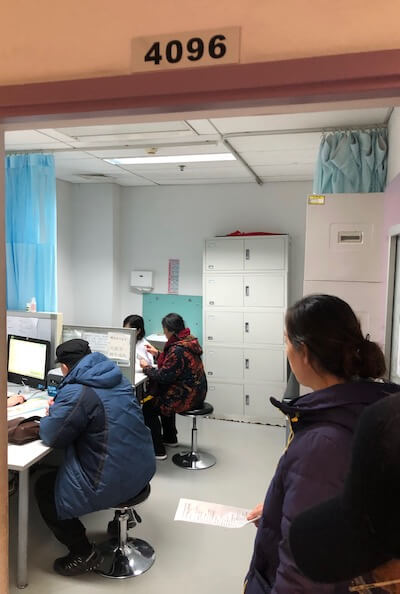
- When arriving at the hospital at about 1pm I immediately went to the Gastroenterology department payment counter. I could use the same Beijing hospital medical card that I had obtained at the Chaoyang Hospital for registering and paying the consultation fee.
- After waiting about 30 minutes I saw the physician in a small consultation room shared by two doctors; each seeing patients at the same time.
- After a few questions about my ailment the doctor ordered some urine and blood tests to see if I had an infection, as well as an ultrasound of my urinary tract.
- I paid for the tests: RMB 26 (US$ 3.80) for the urine test, RMB 122 (US$ 17.70) for a couple of blood tests, and RMB 120 (US$ 17.30) for the ultrasound exam.
- I first went to take the urine and blood tests, which only required a few minutes of waiting, and then went for the ultrasound exam.
- I waited about 30 minutes for the ultrasound exam. After completion, I was given the report almost immediately.
- Within 1 hour I had collected the results of all the other tests.
- Fortunately, it was not yet 4:30pm when doctors finish seeing patients. So I went back to the same consultation room. As soon as the doctor was finished with a patient I handed her my test results and she asked the next person in line to wait while she went over them with me. No need to book a new appointment.
- The results showed I had a mild infection so the doctor prescribed some antibiotics for which I paid RMB 46 (US$ 6.70).
- The doctor, however, thought the chronic pain I was experiencing might be caused by something other than the infection. So she also prescribed a different ultrasound especially for my upper abdomen. The fee for this ultrasound exam was RMB 120 (US$ 17.30).
- In case the ultrasound would show I had a kidney stone she said I would need to see a doctor in the Surgery Gastroenterology department (Xiāohuà Wàikē – 消化外科) to go over the results.
- It was the end of the day, but I was still able to go to the payment counter and book an appointment for the ultrasound exam for the next morning.
- I tried to use the 114 Health app to book a surgeon’s appointment for the following afternoon to go over the ultrasound exam results. However, there were no available appointments showing on the 114 Health app until a few days later.
- One of the nurses at the hospital suggested I try the JingYiTong doctor appointment app instead. This app would not allow me to register with my foreign passport, but did allow me to register an account with the Beijing hospital medical card I had obtained at the Chaoyang Hospital.
- With the JingYiTong app I was pleased to find an appointment available for the next afternoon. The fee for a general doctor in the Surgery Gastroenterology (digestion) department was also RMB 50 (US$ 7.30). The JingYiTong app requires you to immediately pay for the consultation online with WeChat Pay.
Ultrasound and CT Scan
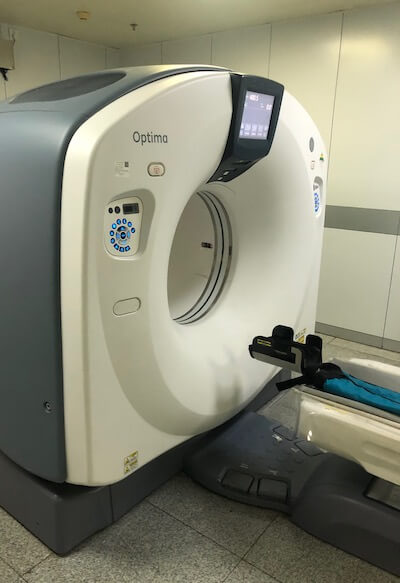
- The next morning I came to the hospital and checked-in (Bàodào – 报道) at the ultrasound department. After about 30 minutes my name appeared on the board and I took the exam. I was given the report a few minutes after completion.
- In the afternoon I had the consultation with the surgeon. He said the ultrasound did not show anything wrong, but suggested I take a CT scan. This would show my kidneys and other organs much more clearly than the ultrasound.
- I was worried a CT scan would be very expensive, and take a long time to arrange. But the surgeon told me it would only cost RMB 500 (US$ 73) and I might be able to have it done quite quickly.
- I took the form to the CT scan registration desk where I paid the fee and was fortunate to get a waiting number for a test that same afternoon.
- I went to the CT scan waiting area and after about one and a half hours was called into the room. The CT scanner was an Optima brand machine, manufactured by GE of the US.
- After completing the CT scan I went to find my original surgeon; without the need to book a new appointment. He was able to look at the scan results on his computer immediately. He said that there did not seem to be any major problem, but that I would need to wait a few days for the official report from the CT Scan technical staff.
CT Scan Results

- 3 days later I went to the hospital to pick up the CT scan results. I scanned my form at an ATM-like machine and the scans and a report printed out.
- I had booked a new appointment for a surgeon to go over the CT scan report; RMB 50 (US$ 7.30).
- With the CT scan report I went for my new appointment. Again, the surgeon said the CT scan did not show anything unusual.
- The Surgeon concluded that the pain was probably caused by a digestion problem which medicine might be able to cure. He suggested, therefore, I take all the test results back to the Internal Medicine department for further consultations.
Final Consultation
- I booked another appointment for the Internal Medicine department for the morning of a couple days later; RMB 50 (US$ 7.30).
- This appointment was in the same consultation room I had gone to for my first appointment, but with a different doctor. However, the physician I had first met was also on duty in the same room and when I said hello to her she immediately took over my consultation.
- The physician looked over all my ultrasound and CT scan results. She ordered some new blood tests to make sure the infection for which she had prescribed antibiotics was cured. She also ordered another more specialized biochemical blood test for RMB 257 (US$ 38).
- I was able to immediately take the test, but this special type of blood test took 2 hours before the results were available.
- In the afternoon, with the test results I returned to the same doctor without needing to book a new appointment.
- After going over all the new and old test results the doctor said my infection had been cured and that the reason for the chronic pain was irritable bowel syndrome (IBS).
- The physician prescribed me Dicetel, a drug manufactured by the big American pharmaceutical company Abbott at their factory in China. The fee for a one month supply was RMB 157 (US$ 23).
Results
- The initial infection was cured with the antibiotics.
- After taking the IBS medicine for a few days my digestion improved and the chronic pain dissipated.
- Although it took several visits to the hospital and many tests, spending about RMB 1,500 (US$ 220) in total, I was very happy with the final result.
- All the appointments and exams were arranged and completed within just ten days of booking the first appointment through the app. Much quicker than it would have taken to go through the same process in the West.
- The multiple ultrasound and CT scans gave me the peace of mind that I did not have anything more serious. They were also relatively cheap.
- The doctor managed to diagnose a chronic issue that I had been having for some time and the treatment has improved my ailment.
- Of course, a foreigner would have great difficulty going through this whole process without speaking Chinese. Otherwise, one would need a very patient Chinese friend to accompany them.
- As my medical insurance only covers inpatient care it did not cover the costs of these consultations and tests. But, as they were relatively cheap it was less burdensome doing them at a public Beijing hospital than having them done at an international hospital.
VIP Ward of the Beijing Friendship Hospital
Like the China-Japan Friendship Hospital, the VIP ward of the Beijing Friendship Hospital has its own building. It is called the International Medical Center.
The consultation fee for this VIP ward ranges from RMB 150 (US$ 22) to RMB 300 (US$ 44).
The staff here speak quite good English and you can book a doctor appointment by phone; Tel: 63137606, 63137607, 63137608.

Beijing Friendship Hospital Contact Information
Address:
95 Yong’an Road, Xicheng District, Beijing
Website:
http://www.bfh.com.cn/Html/News/Articles/123.html
http://www.bfh.com.cn
WeChat ID:
BFH1952
International Medical Center:
Appointment Hotline: 63137606, 63137607, 63137608
Peking Union Medical College Hospital Review
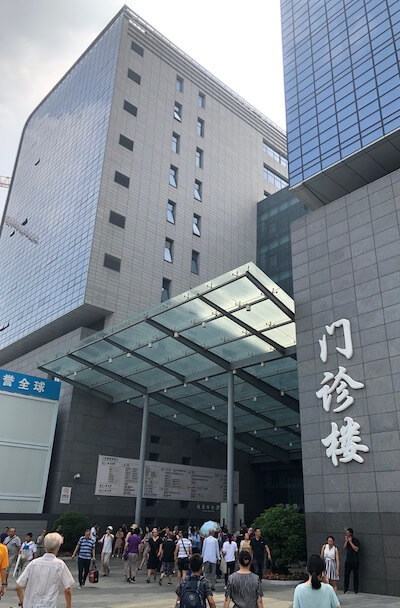
Otherwise known as Xiehe hospital, the Peking Union Medical College Hospital (PUMCH) is one of the oldest western medicine hospitals in China.
It was originally established by the Rockefeller Foundation in 1921. The Hospital Management Institute at Shanghai’s Fudan University has ranked PUMCH the best hospital in China for several years.
PUMCH has two campuses. The main campus is located downtown in Dong Cheng district near to Wangfujing. The other campus is located in Xidan.
The outpatient section of the Wangfujing campus is in a brand new ultra-modern building that looks like a fancy office complex.
Behind this main building in the hospital compound is the original Xiehe Hospital building from 1921.

Further in the back of the compound is the International Medical Service (IMS) building; the VIP section of PUMC. This is the largest VIP ward covered in these hospital reviews.
Unlike the 3 other hospitals reviewed here, foreigners are not allowed to use the main section of the PUMC Hospital. Instead, they must go to International Medical Service (IMS) building.
The doctors and staff in this section are mostly locals, but speak quite good English, some having done training or research overseas.
VIP Ward of PUMCH
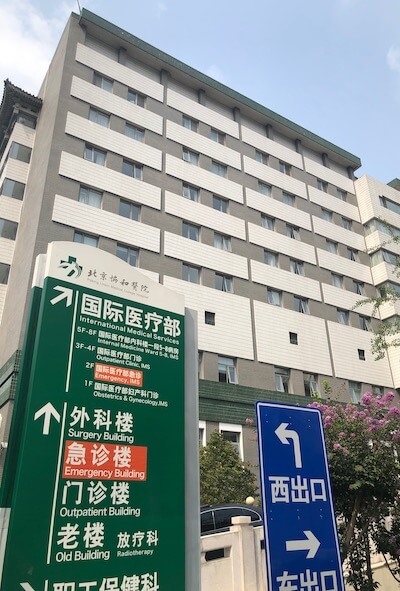
The VIP ward of PUMC Hospital is called International Medical Service (IMS).
The consultation fee for IMS is RMB 600 (US$ 87), 900 (US$ 130) or 1,200 (US$ 174), depending on the type of doctor you need to visit.
The fees for tests and procedures in the IMS are 2-20 times the price in the main section of the PUMC Hospital.
IMS accepts direct billing from several private medical insurance companies. You can visit the PUMC Hospital to see if your medical insurance policy is accepted for direct billing.
Peking Union Medical College Hospital Contact Information
Main Campus
1 ShuiFuYuan, Wangfujing, Dong Cheng District
Tel: 6529 6114
Xidan Campus
No.41 Damucang Hutong, Xicheng District
Website:
https://www.pumch.cn/en.html
https://www.pumch.cn/en/medical_care.html
https://www.pumch.cn/index.html
WeChat ID:
pumch1921
App:
https://apps.apple.com/ca/app/北京协和医院/id999678729
International Medical Services (IMS):
Tel: 69156699 (press 2 for English service)
WeChat ID: IMS_PUMCH
